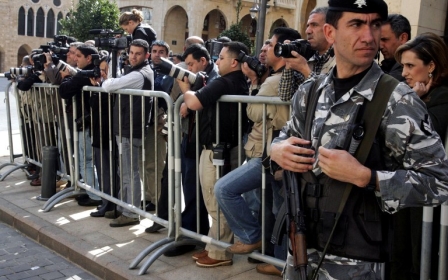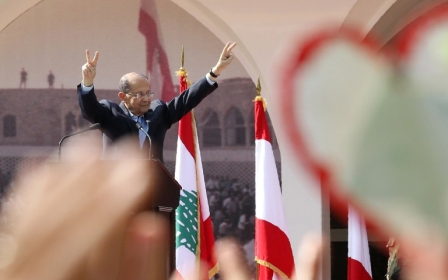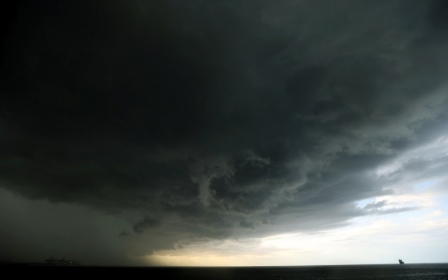Is the writing on the wall for Lebanon's news industry?
LEBANON - On 31 December, As-Safir, one of the oldest pan-Arab daily newspapers, closed down, after 42 years in publication. Suffering from a lack of revenue, a last-minute injection of funding last April was not enough to save it from its fate.
"We have no more money," said the founder and editor-in-chief Talal Salmane in an interview with Middle East Eye.
"We struggled to remain [printing] as long as possible but times have changed. The political debate in Lebanon and in the region is dead, so our writing finds less and less of an echo," said Salmane.
Since 1974 As-Safir (The Ambassador) has claimed to be "the voice of the voiceless". Throughout the Lebanese civil war (1975-1990), it was known for supporting the Palestinian cause and propagating Arab nationalism. But since the start of the Syrian conflict in 2011, As-Safir published a number of articles in support of the Assad government.
As a reaction to this, Saudi Arabia, which backs the Syrian opposition to Assad, cancelled all subscriptions to As-Safir. According to Salmane however, the loss of revenues from Saudi readership did not exceed $33,000 a year and therefore did not have a major impact on the newspaper's finances.
However, with the rise in popularity of online media, newspapers such as As-Safir have become less popular, causing print media in Lebanon to lose advertising revenue and sales. As-Safir, which sold over 50,000 copies a day in 2010, was only selling about 10,000 copies by 2016.
A widespread crisis
The story of As-Safir is not an isolated case; most Lebanese newspapers fear they may have to close down in the near future.
In December, the country's oldest paper, An-Nahar, sacked about 40 staff members after not having paid their salaries in over a year.
A few months prior to that, the pro-Hezbollah Al-Akhbar newspaper and its rival, Al-Mustaqbal, which supports Prime Minister Saad Hariri, also laid off a large number of their staff writers.
"They told us we were no longer needed and that we had four days to leave. One of my colleagues fainted [after hearing the news]. We had to call her an ambulance," said one of the 52 journalists who was sacked from Al-Mustaqbal in September and wishes to remain anonymous. He fears that disclosing his identity may prompt the paper to withhold 14 months-worth of unpaid salary.
The Hariri-owned television network Future TV is also mired in struggle. Established in 1993 by late prime minister Rafic Hariri, and now headed by his son Saad, Future TV and Future News support the views of his party The Future Movement.
"I haven't been paid my full salary since February 2015. The TV channel owes me over ten thousand dollars," said a journalist at Future News who also wishes to remain anonymous.
Middle East Eye contacted the management of An-Nahar, Al-Akhbar, Al-Mustaqbal and Future News, but they declined to comment on the matter.
Working for free
Even though a large number of Lebanese journalists have not been receiving their wages, many often continue to write, film and present the news.
The lack of funds and unpaid wages have become taboo subjects that are rarely discussed.
Journalists speaking to MEE insisted on remaining anonymous for several reasons. Some argued that they fear retribution by their employers who may dismiss them without compensation. Others claimed to feel a sense of loyalty towards their employers and did not wish to portray them in a negative light.
The lack of funds and unpaid wages have become taboo subjects that are rarely discussed
"We are going through a bad time, but it will pass. I do not want to point a finger at my bosses because it's not their fault," said a Lebanese reporter, who has not been paid for eight months and wishes to remain anonymous.
The financial crisis facing the media industry in Lebanon has had grave consequences on the daily lives of Lebanese journalists. Without an income, a large number of people working in the media struggle to pay their rent, mortgage, children’s school fees and daily expenses.
"I have borrowed thousands of dollars from my family and friends. It is humiliating but I don't have a choice. I don't know what will happen if this continues," said a journalist at Future News TV channel.
Others have to work several jobs at the same time.
If unpaid workers wish to remain silent it is also because the Lebanese legal system offers few avenues for journalists to fight for their rights. When asked if they had gone on strike, the majority of the journalists said they hadn't.
In Lebanon, the print journalists' union must take decisions jointly with their employers' syndicate. As they usually have conflicting interests, collective action is paralysed.
Another option for unpaid staff is to ask for mediation at the Ministry of Labour. The ministry then calls up both parties to try to reach common ground. Several journalists from Al-Mustaqbal and An-Nahar have begun such procedures.
If mediation fails, journalists can always sue their employers in court, but it is costly to hire a lawyer and reaching a verdict can take years.
One employee at Future News TV recalled an attempt by a small group of journalists to strike and block the broadcast of a programme on the TV channel. After a meeting with the management, to which only the editors were invited, the strike attempt was aborted without explanation.
Foreign money dries up
The media sector is facing a worldwide crisis due to a decrease in advertising revenues and the rapid development of the digital media sector. In Lebanon, the situation is further complicated, leaving newspapers and news channels unable to pay salaries because the economic model on which they rely is crumbling.
"There is something fundamentally abnormal in the Lebanese media landscape," said Scarlett Haddad, a member of the executive council of the syndicate of print journalists. "There are more than 10 daily newspapers for a country of only four million people. Who reads those papers? How can they ever be profitable? This only points to one conclusion: media money has always been political money."
'There are more than 10 daily newspapers for a country of only four million people ... How can they ever be profitable? This only points to one conclusion: media money has always been political money'
In Lebanon, the vast majority of media outlets do not function like regular companies. Sales and advertising revenues are not enough to cover production costs, and since their creation Lebanese newsrooms have survived thanks to funding from foreign investors. In exchange for their contributions, such investors look to assert political influence.
That was particularly true in the 1970s. Back then, Lebanon offered a unique cultural openness and freedom of expression. Beirut was the region's media hub and managed to attract important financial support for its publications. Investors included Libyan leader Muammar Gaddafi, Iraq's Saddam Hussein, Tunisia's former president Ben Ali as well as Saudi royals.
"The Lebanese press was the mirror of the Arab world. Newspapers such as As-Safir and An-Nahar were read everywhere, and leaders from all over the region expressed their views through columns [in Lebanese papers]," recalled Haddad.
"Gulf countries, Iraq and Libya, used to finance the Lebanese press so that it would carry out political battles [on their politicians' behalf]. As a result, Lebanese editors thought big and spent a lot of money. But today, that foreign money is gone."
The decline in foreign funding started when Gulf countries launched their own TV channels and networks. With pan-Arab channels like Al Jazeera or Al-Arabiya, regional leaders can now bypass the Lebanese press.
More recently, the fall in oil prices – from $110 a barrel in 2014 to less than $30 in 2016 - has also forced Gulf countries to cut down on their funding of foreign media networks.
Independent journalism at stake
The Lebanese media's economic model has a direct impact on the nature of journalism. Since the media does not rely on readership but rather on investors as a source of revenue, little effort is made to produce quality journalism.
Moreover, with the media being closely tied to political agendas, journalists are often expected to act like political activists.
"Bribes are a very common thing in our profession. We are often given money to publish certain information, or on the contrary, keep silent on it," said a senior journalist at one of the newspapers hit by the crisis.
Given the financial crisis newsrooms are now facing, it will become even harder for journalists to resist such offers.
Syndicates have called for the government to support the country's media. Last year, former minister of information Ramzi Joreige announced the creation of a $10 million fund to support Lebanese newspapers, but the plan was never voted on in parliament.
The plan included rescheduling the debts of certain newspapers in agreement with the Central Bank of Lebanon, providing incentives for public institutions to contract new subscriptions, reducing taxes for imported paper and ink and, more importantly, establishing a fund to aid Lebanese papers.
Following the election of a new president in October, Prime Minister Saad Hariri named Melhem Riachi, a former journalist, as minister of information. On several occasions, Riachi promised he would protect journalists, but concrete measures have yet to be seen.
New MEE newsletter: Jerusalem Dispatch
Sign up to get the latest insights and analysis on Israel-Palestine, alongside Turkey Unpacked and other MEE newsletters
Middle East Eye delivers independent and unrivalled coverage and analysis of the Middle East, North Africa and beyond. To learn more about republishing this content and the associated fees, please fill out this form. More about MEE can be found here.




